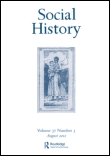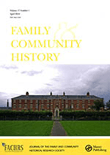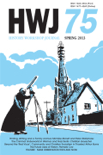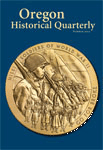
Oral History Review
Scope & Guideline
Innovative Insights, Timeless Tales.
Introduction
Aims and Scopes
- Oral Histories of Social Movements:
The journal consistently focuses on oral histories that document social struggles and movements, showcasing how personal narratives contribute to our understanding of collective actions and societal changes. - Interdisciplinary Approaches:
The 'Oral History Review' embraces interdisciplinary methodologies, integrating insights from sociology, anthropology, and cultural studies to enrich the analysis of oral histories. - Ethics and Methodology in Oral History:
A core area of focus includes discussions on ethical considerations and methodological innovations in conducting oral history interviews, ensuring respectful and accurate representation of voices. - Cultural and Community Narratives:
The journal highlights narratives from marginalized communities, exploring issues of identity, memory, and representation through the lens of oral history. - Impact of Technology on Oral History:
A unique contribution of the journal is its examination of how digital tools and technologies are transforming oral history practices, including archiving, accessibility, and dissemination.
Trending and Emerging
- Intersectionality in Oral Histories:
There is an increasing focus on intersectionality, exploring how multiple identities (such as race, gender, and class) intersect within oral histories, which enriches the understanding of complex social dynamics. - Oral Histories of Crisis and Disaster:
Recent publications highlight oral histories related to crises, including natural disasters and pandemics, emphasizing the importance of personal narratives in understanding the impacts of such events on communities. - Technology and Digital Oral Histories:
The integration of technology in oral history practices is trending, with a focus on digital archiving, online sharing platforms, and virtual storytelling, enhancing accessibility and engagement. - Community Engagement and Participatory Methods:
Emerging themes emphasize community engagement in oral history projects, where local voices shape the narratives, fostering a sense of ownership and collective memory. - Mental Health and Oral History:
An emerging focus on the relationship between mental health and oral history narratives reflects a growing recognition of how storytelling can be therapeutic and empowering for individuals and communities.
Declining or Waning
- Traditional Historical Narratives:
There is a noticeable decline in the emphasis on traditional historical narratives that do not incorporate personal or oral testimonies. The journal has shifted towards more innovative and participatory approaches. - Single-Dimensional Oral Histories:
The focus on single-dimensional oral histories that only reflect one perspective or narrative is diminishing, as there is a growing recognition of the need for multifaceted and diverse voices. - Strictly Academic Oral History:
The journal is moving away from purely academic analyses of oral history, favoring more inclusive and community-based projects that engage with broader audiences. - Oral History in Isolation from Current Events:
There is a decreasing trend in discussing oral histories that do not connect to contemporary social issues or movements, as the journal increasingly seeks to relate historical narratives to current societal challenges. - Formal Interview Structures:
The traditional, formal interview structures are becoming less common, with a shift towards more conversational and dynamic interviewing techniques that prioritize the narrator's agency.
Similar Journals

SOCIAL HISTORY
Advancing Insights into Society's PastSOCIAL HISTORY, published by Routledge Journals, Taylor & Francis Ltd, is an esteemed journal dedicated to advancing the field of historical research, specifically focusing on the social dimensions of history. With an ISSN of 0307-1022 and an E-ISSN of 1470-1200, this journal has consistently contributed to the scholarly discourse since its inception in 1976. Positioned in the Q2 category for history in 2023, it ranks 240 out of 1760 in the Arts and Humanities, placing it in the top 14% of its field according to Scopus metrics. Although it is not an Open Access journal, its accessibility through institutional subscriptions ensures that a wide range of researchers, professionals, and students engage with its rich variety of articles that explore social history's diverse themes and methodologies. The journal aims to foster a deeper understanding of how historical events shape societies, offering valuable insights for those interested in the intricate interactions between past and present.

FAMILY & COMMUNITY HISTORY
Exploring the Ties that Bind: Unraveling Family and Community NarrativesFAMILY & COMMUNITY HISTORY, published by Routledge Journals, Taylor & Francis Ltd, is a pivotal academic journal focusing on the intricate dynamics of family and community history within the fields of History, Sociology, and Political Science. With its ISSN 1463-1180 and E-ISSN 1751-3812, the journal serves as a valuable platform for researchers and scholars to explore the historical narratives that shape familial and communal identities across different time periods and geographical contexts. Although it currently resides in the Q4 category for both History and Sociology and Political Science, its commitment to publishing innovative research makes it a noteworthy contributor to ongoing discussions in these fields. The journal operates without an Open Access model, ensuring a curated approach to the dissemination of research while maintaining academic integrity. Established with the aim of bridging the gap between historical inquiry and contemporary societal issues, FAMILY & COMMUNITY HISTORY is an essential resource for those dedicated to uncovering and understanding the foundational roles that families and communities play in our collective past and future.

PUBLIC HISTORIAN
Exploring the Nexus of History, Museology, and ConservationPUBLIC HISTORIAN is a leading peer-reviewed journal published by University of California Press, dedicated to advancing scholarship in the fields of history, museology, and conservation. Since its inception in 1978, this journal has provided an essential platform for researchers, professionals, and students to explore the intricate relationships between historical interpretation and public engagement. With a commendable impact factor reflected in its rankings—Q2 in Conservation, Q2 in History, and Q2 in Museology—the journal is recognized for its rigorous academic contributions and insightful discourse. Although it does not currently offer open access options, the journal remains a crucial resource for those involved in the preservation and presentation of historical narratives. With its convergence into 2024, PUBLIC HISTORIAN continues to shape the field by connecting theory and practice, making it an invaluable asset in the academic community.

Genealogy, an esteemed journal published by MDPI, serves as an open access platform dedicated to the exploration of genetic heritage and lineage studies. Based in Switzerland, this journal has been promoting scholarship in the fields of biochemistry, genetics, and molecular biology since it became open access in 2017. With its presence on the Scopus database, it provides valuable insights into diverse aspects of genetics, albeit currently positioned in quartile four across multiple categories, reflecting an emerging footprint in the academic arena. The journal features articles that not only contribute to the understanding of genetic inheritance but also encourage interdisciplinary collaboration among researchers, professionals, and students dedicated to the advancement of genetic studies. As such, Genealogy aims to foster innovative research that informs both theoretical frameworks and practical applications in genetics, making it a pertinent resource for audiences keen to delve into the intricacies of genetic lineage.

HISTORY WORKSHOP JOURNAL
Advancing the dialogue of history through rigorous research.Welcome to the History Workshop Journal, a premier academic publication housed under the esteemed Oxford University Press. With a rich history dating back to 1976 and converging through 2024, this journal is dedicated to enhancing discourse in the field of history, featuring cutting-edge research that offers fresh perspectives and innovative methodologies. Recognized for its exceptional quality, the journal is ranked in the Q1 category for History and Q2 for History and Philosophy of Science as of 2023, making it a vital resource for scholars aiming to explore interdisciplinary connections within the humanities. The Scopus rankings reinforce its significance, with a notable 88th percentile placement in History. By publishing rigorous peer-reviewed articles, the History Workshop Journal aims to foster scholarly engagement and critical dialogue, making it an indispensable tool for researchers, professionals, and students seeking profound insights into historical narratives and methodologies.

YALE FRENCH STUDIES
Advancing the Discourse of Francophone Literature and CultureYale French Studies is a prominent academic journal published by Yale University Press in the United States, dedicated to advancing the discourse on Francophone literature, culture, and thought. With an ISSN of 0044-0078, this journal serves as a vital platform for interdisciplinary scholarship, encompassing areas such as cultural studies, history, and sociology. Although it operates under a traditional subscription model, its contributions are significant, particularly between the converged years spanning 2002 to 2014, 2018 to 2019, and 2021 to 2023. The journal currently holds Q4 rankings in various categories, including cultural studies and visual arts, and offers rich, scholarly insights that are crucial for researchers, professionals, and students alike. As an esteemed publication in the realm of literature and literary theory, Yale French Studies is instrumental in fostering a deeper understanding of French cultural contexts and their global implications, marking it as an essential resource for anyone engaged in Francophone studies.

Tempo e Argumento
Encouraging Diverse Voices in Historical InquiryTempo e Argumento is a distinguished academic journal dedicated to the field of History, published by the Universidade do Estado de Santa Catarina (UDESC), Brazil. Since its inception in 2009, this Open Access journal has aimed to foster scholarly dialogue and disseminate research findings that contribute to historical discourse and understanding. With a commendable Q1 classification in the 2023 category quartiles and a current rank of #940 in Scopus for Arts and Humanities - History, it stands out for its commitment to high-quality academic output. The journal invites contributions from diverse perspectives, promoting innovative discussions among researchers, professionals, and students alike. Scholars can find the journal's articles freely accessible, enhancing the visibility and impact of their work. For those interested in the evolving narratives of history, Tempo e Argumento provides an essential platform for exploration and inquiry.

Expressions maghrebines
Connecting Cultures Through Literary ExplorationExpressions maghrebines, an esteemed journal published by Florida State University, fosters scholarly dialogue in the realm of Literature and Literary Theory, focusing on the vibrant narratives and critical discourses emerging from the Maghreb region. Established in 2002, this journal has become a vital resource for researchers, professionals, and students, illustrating a commitment to exploring contemporary trends in Francophone literature. With an impressive Q3 rank in 2023, it stands within the top echelon of its category, offering insightful analyses and innovative perspectives to enhance academic understanding. Though not an open-access publication, Expressions maghrebines is indispensable for those seeking to delve into the cultural and intellectual currents that shape Maghreb literary landscapes, thus reinforcing its position as a significant contributor to the academic community's exploration of Francophone studies.

20 Et 21-Revue D Histoire
Navigating the Complexities of the Past20 Et 21-Revue D Histoire is a prominent academic journal published by PRESSES SCIENCES PO, targeted towards scholars and professionals in the field of history. With its ISSN 2649-664X and E-ISSN 2649-6100, this journal features rigorously peer-reviewed research that explores the complexities of historical narratives from various perspectives. Although it does not offer Open Access options, it remains a valuable resource for those engaged in the study of French history and broader historical discourse. Established with a commitment to scholarly excellence, the journal’s coverage period from 2022 to 2024 reflects its ongoing contribution to critical dialogue in arts and humanities, positioning itself at the 25th percentile among its peers in the Scopus rankings. As history continues to inform contemporary societal issues, 20 Et 21-Revue D Histoire serves as an essential platform for advancing knowledge and fostering research collaboration.

OREGON HISTORICAL QUARTERLY
Documenting History, One Quarter at a Time.OREGON HISTORICAL QUARTERLY, published by the OREGON HISTORICAL SOCIETY, is a premier scholarly journal dedicated to the exploration and documentation of Oregon's vibrant history. With its initial publication dating back to 1968, the journal has evolved to become a significant contributor to historical scholarship, addressing a diverse range of topics that reflect the cultural and social dynamics of Oregon and the broader Pacific Northwest. This reputable journal, categorized in the third quartile (Q3) of 2023 in History, is ranked #1030 out of 1760 in the Scopus database, positioning it within the 41st percentile of its field. While not an open-access journal, the OREGON HISTORICAL QUARTERLY serves as a vital resource for historians, educators, and students, fostering a deeper understanding of historical narratives and encouraging scholarly discourse. Its commitment to historical research makes it an essential publication for anyone interested in the rich tapestry of Oregon's past.